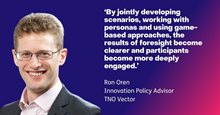Overall well-being
A lack of space and labour is forcing our densely populated country to make choices. This is especially the case for our cities. There are a number of developments that will have a major impact on urban development in the coming decades.
For example, in the future, the Dutch government will concentrate more on earning power and overall well-being. This means taking a broader view than economic prosperity alone. Besides economic goals, the focus is also on sustainability, welfare, and well-being.
What our cities could be like
The ideal image of the climate-neutral and smart city? This includes a multitude of features. The city of the future:
- Has a housing supply that matches the needs of residents.
- Enables people to move around easily, sustainably, and safely.
- Is green and varied, with ample water.
- Ensures that no residents are socially disadvantaged.
- Provides sufficient cooling on hot summer days.
- Is climate-neutral (emits less CO2 than it absorbs)
- Is safe in every conceivable way.
- Is clean.
- Builds with sustainable materials.
- Offers beautiful and well-maintained public facilities.
- Has a lot to offer culturally.
- Is attractive to cyclists and walkers.
In short, these are cities that not only do well economically, but are also very pleasant environments for living, working, learning, and pursuing leisure activities. Digitalisation helps make all the above easier to monitor and manage.
Stepping stones towards climate-neutral cities
Cities have big ambitions – and long wish lists. Delivering on promises requires the active involvement of many different parties. A large number of pilot projects and experiments related to climate-neutral and smart cities are already in progress. These are positive steps on the way to the city of the future.
At the same time, much is still unclear regarding the necessary innovations. And there are many questions:
- Who is engaged in what and who is responsible for what?
- How do different initiatives relate to each other?
- How is the exchange of knowledge arranged?
- What are the schedules for the various initiatives?
- Do targets need to be adjusted partway through a process?
- Above all, who has a comprehensive overview and can answer all these questions?
Ongoing initiatives: Climate-Neutral and Smart Cities
As mentioned above, initiatives are already underway in the move towards the smart and climate-neutral city of the future. One example is the EU’s Climate-Neutral and Smart Cities mission. There are so many initiatives that the word fragmentation is appropriate and there is a need for governance. And that is exactly the role that fits TNO Vector well:
- Qualitative and quantitative research
TNO Vector is able to collect information both in breadth and depth. We analyse that information and share it transparently with all stakeholders. - Multidisciplinary collaboration
TNO Vector also has experience in leading initiatives where governments, companies, knowledge institutions, social institutions, and citizens experiment, learn, and innovate together to achieve shared goals. - Examples at home and abroad
Our specialists look beyond local initiatives in the cities themselves to what is already happening in the same field in other cities, not only nationally, but also at European level. Through TNO Vector, for instance, we are closely involved in various Smart City Lighthouse projects and in the EU mission ‘100 Climate-Neutral and Smart Cities by 2030’ via NetZeroCities.
A national structure for climate-neutral and smart cities
The European project was already ambitious and there are now serious plans to scale up. The European focus on Climate-Neutral and Smart Cities is inspiring: the Dutch government wants a national structure for Dutch municipalities.
Within that structure, municipalities can experiment with the climate-neutral, smart cities of the future, while learning from European initiatives.
TNO Vector is helping set up that national structure. We know what is going on and what the needs are in participating municipalities and cities. And our speciality is coordinating collaboration between organisations from different backgrounds.
Despite the complexity of these projects, we believe we can make rapid strides in the Netherlands. For example, we are working together on the EU mission ‘100 Climate-Neutral and Smart Cities by 2030’.




